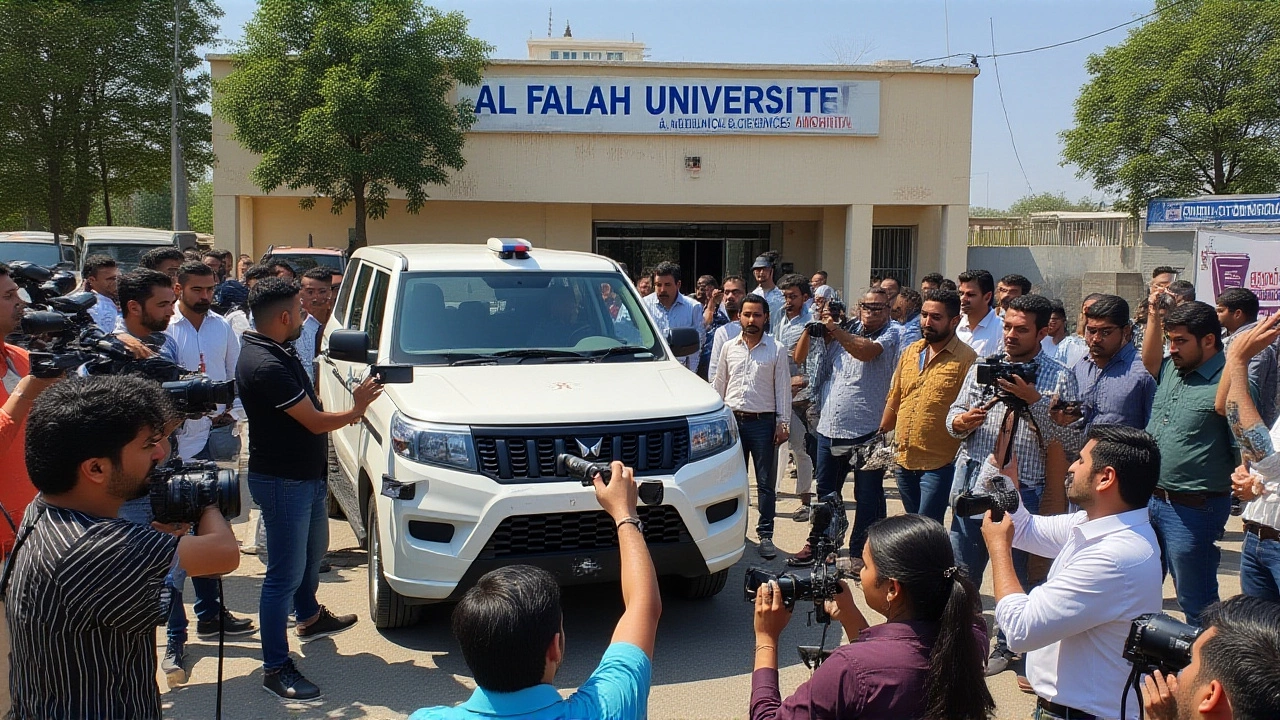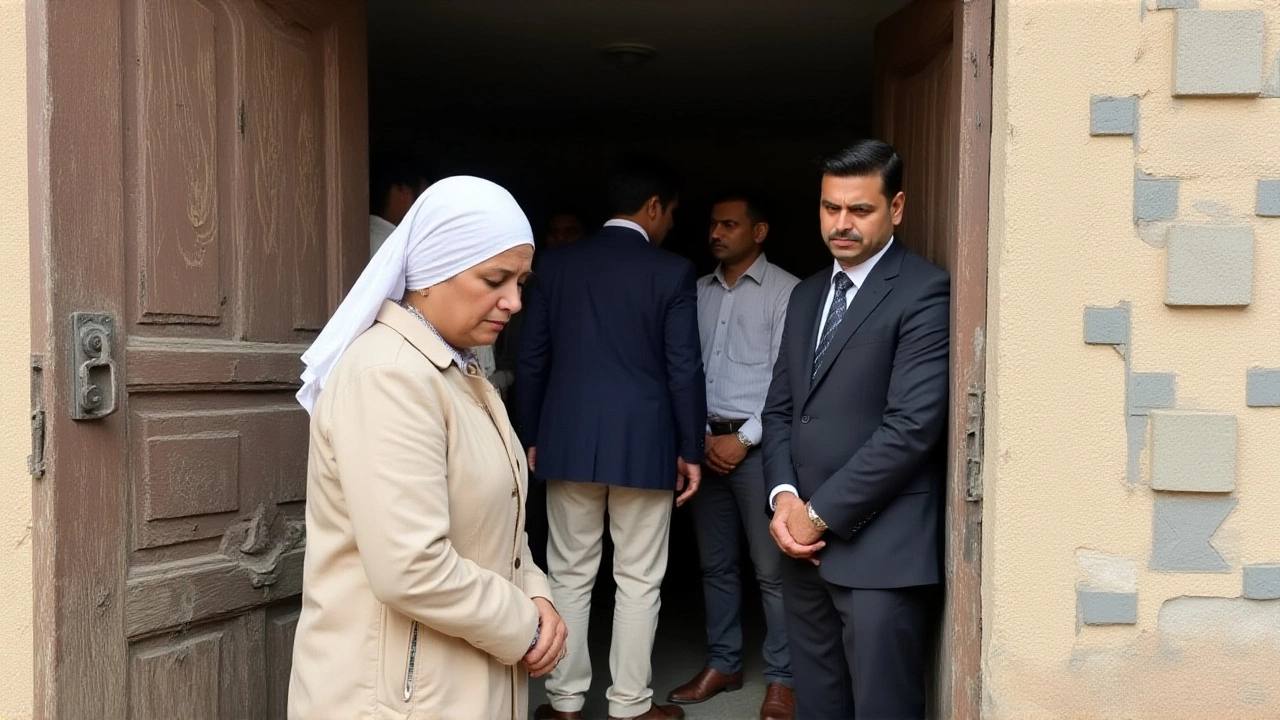The Jawad Ahmad Siddiqui, founder of Al-Falah University in Faridabad, was arrested by the Enforcement Directorate (ED) on November 16, 2025, in a sweeping money laundering operation tied to the deadly Delhi blasts. Simultaneous raids at 25 locations across the Delhi-NCR region uncovered a chilling network: university hostel rooms had been turned into makeshift bomb labs by three doctors — Shaheen Shahid, Umar (killed in the blast), and Mujammil Shakeel. The investigation, still unfolding, reveals how an educational institution with over 5,000 students became the nerve center of a terror financing pipeline — and how ordinary jobs, like electricians and car sales, were weaponized to fund violence.
From Classroom to Bomb Lab
What makes this case so disturbing isn’t just the scale — it’s the banality of it. According to Faridabad Crime Branch investigators, Shaheen, Umar, and Mujammil used the university’s medical hostel to experiment with explosive materials. One officer described finding “chemical residues, wiring, and timer devices” hidden beneath floorboards in Room 307 of the male hostel block. The doctors, all graduates of Kashmiri medical colleges, reportedly held weekly “study sessions” that no one questioned — until a neighbor noticed smoke coming from their room on September 20, 2025. By then, they’d already tested three small devices in remote fields near Palwal.
Perhaps the most damning piece of evidence? A photograph taken on September 25, 2025, at a Maruti Suzuki showroom in Gurgaon. In it, Shaheen and Mujammil stand beside a newly purchased Maruti Brezza, smiling. The car was later found parked in the university’s staff lot, its trunk lined with traces of ammonium nitrate. Delhi Police’s Special Branch confirmed the vehicle’s registration was linked to a shell company, Al-Falah Infrastructure Solutions, one of nine identified by the ED as fronts for terror funding.
The Electricians, the Hawala, and the Hidden Network
Two electricians — Rizwan and Shoeb — were arrested from Nuh’s Hayat Colony on the same day as Siddiqui’s arrest. Shoeb had worked on electrical upgrades at Al-Falah University’s lab wing in 2023. Investigators believe he used his access to install hidden wiring that later powered bomb triggers. Rizwan, his cousin, allegedly funneled funds via hawala channels from Pakistan, routing money through Dubai and Nepal. “They didn’t carry cash,” said an ED official. “They used traders, gold dealers, even wedding gift lists to move value.”
That’s why the ED is now probing 200 individuals. Among them: two foreign nationals arrested near the Nepal border — one from Afghanistan, another from Pakistan — both posing as visiting professors at Al-Falah. Both had no teaching credentials, but both had bank transfers from accounts linked to the university’s trust. Meanwhile, the ATS has raided locations in Lucknow and Jaipur, freezing 17 more shell companies. The network, authorities say, operated like a pyramid: doctors recruited students, students recruited local tradespeople, and the university’s administrative staff turned a blind eye — for a cut.

Al-Falah University: A Legacy of Quiet Expansion
Founded in 1999 as an engineering college, Al-Falah University received its university status in 2014 — just months after the UGC flagged irregularities in its infrastructure funding. Its MBBS program, launched in 2019, quickly became a magnet for students from Kashmir, Jammu, and even Bangladesh. According to NDTV, nearly 40% of its medical faculty hail from Kashmir. That’s not unusual — but what is, is how few questions were asked. “We had no idea,” said one senior professor, who spoke on condition of anonymity. “They were quiet. Always in the labs. Never at faculty meetings.”
Even more alarming: Delhi Police sources confirmed that Beg, a suspect wanted in the 2008 blasts in Rajasthan and Gujarat, was enrolled at Al-Falah in 2007 — when it was still an engineering college. His name appears in old admission records. He vanished after two semesters. Now, investigators are re-examining every student who left the university between 2007 and 2020.
Who’s Next? The Investigation Expands
The Faridabad Police have formed a 12-member Special Investigation Team (SIT) with one mandate: unravel the local support network. Interrogations have already revealed names of three local shopkeepers who supplied chemicals under the guise of “medical waste disposal.” One vendor, a pharmacist in Sector 38, admitted he sold hydrogen peroxide and acetone to “Dr. Shaheen” weekly — never asking why.
Authorities say they have digital evidence — WhatsApp logs, CCTV footage, and encrypted files recovered from a university server — showing communication between the three doctors and a shadowy figure known only as “Engineer Bilal,” believed to be the bomb-maker who trained them. Bilal’s voice has been matched to a suspect in the 2022 Patna blast. The ATS plans to question 15 more people connected to Shaheen within 48 hours. More arrests are expected by Thursday.
Students, meanwhile, are fleeing. Over 300 have withdrawn since the raids began. Hostel rooms once filled with medical textbooks now sit empty. “I came here to heal,” said one third-year student, packing her bags. “Now I’m afraid to even walk past the lab block.”

What This Means for India’s Education System
This isn’t just a terror case. It’s a failure of oversight. Al-Falah University received over ₹2.3 billion in government grants between 2015 and 2024 — money meant for labs, libraries, and faculty salaries. Yet audits show 68% of those funds were diverted to shell companies. The UGC has suspended the university’s funding pending a forensic audit. The Ministry of Education has ordered inspections of 47 private universities with similar profiles — especially those with high enrollment from conflict-affected regions.
“We trusted the system,” said a former ED officer now advising the home ministry. “We assumed universities were safe spaces. But when institutions become incubators for hate, it’s not just a crime — it’s a collapse of civic trust.”
Frequently Asked Questions
How did the ED connect Al-Falah University to the Delhi blasts?
The ED traced bank transfers from nine shell companies linked to Al-Falah University’s trust to accounts used by doctors Shaheen, Umar, and Mujammil. Digital forensics recovered WhatsApp messages showing coordination with the blast site, and a car purchased by the doctors — later found parked on campus — contained explosive residue matching materials used in the Delhi attacks.
Why were doctors from Kashmir specifically targeted in this investigation?
While not all Kashmiri doctors are involved, 40% of Al-Falah’s medical staff are from the region — a disproportionately high number. Investigators found that several suspects had studied together in Srinagar before migrating to Haryana. Their shared background, combined with financial isolation and limited job options, made them vulnerable to radicalization — a pattern seen in other terror cases since 2018.
What role did the electricians play in the terror plot?
Shoeb, who worked at Al-Falah University, used his access to install hidden electrical circuits in the hostel’s basement, which later powered bomb triggers. Rizwan funneled money via hawala networks, using wedding gifts and gold purchases to disguise terror funding. Their roles were logistical — not explosive — but critical to operational success.
Are other universities at risk of similar infiltration?
Yes. The UGC has ordered emergency audits of 47 private universities with high enrollment from conflict zones, especially those with weak financial oversight. Al-Falah’s case exposed gaps in how university trusts are monitored — many operate with minimal transparency, making them ideal for laundering funds under the guise of “development grants.”
What happens to Al-Falah University now?
The university’s bank accounts have been frozen, its funding suspended, and its charter under review. The Ministry of Education may revoke its university status if the UGC’s audit confirms systemic fraud. Students are being transferred to other institutions, and faculty are being vetted individually — but the institution’s reputation is likely beyond repair.
Is there evidence linking Jawad Ahmad Siddiqui directly to the bomb-making?
No direct evidence links Siddiqui to bomb-making. But prosecutors argue he enabled the network: he approved funding for hostel expansions that housed the doctors, ignored financial anomalies in the university’s trust, and allowed unchecked access to labs. His arrest is for money laundering and conspiracy — not terrorism — but his inaction, authorities say, was complicity.
